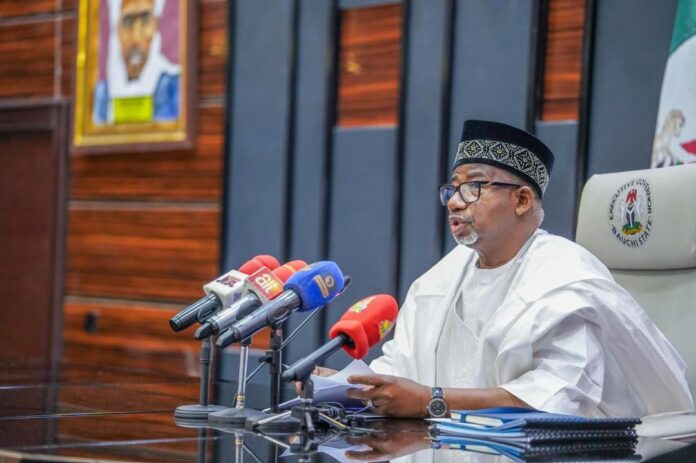From: Ahmad Saka,Bauchi
Governor Bala Abdulkadir Mohammed of Bauchi State has assented to four major bills aimed at strengthening governance, traditional institutions, and workers’ welfare across the state.
The laws include the repeal of the Sayawa Chiefdom and enactment of the Zaar Chiefdom with headquarters at Mhrim community in Tafawa Balewa Local Government area .
Also signed into law was the Chieftaincy Appointment and Deposition Law, which provides for the creation of thirteen new emirates and over one hundred district heads across Bauchi State.
The Governor equally signed into law the Local Government Pension Contributory Scheme, pledging to clear the backlog of pensions and gratuities owed to retired local government workers.
In addition, the 2025 Appropriation Supplementary Act was signed to support the smooth implementation of ongoing developmental projects and programs initiated by his administration.
Assenting to the bills at Government House, Governor Bala Mohammed warned against politicizing or undermining the implementation of the newly enacted laws adding that security agencies are directed to take appropriate action.
Governor Bala named the thirteen new Emirates include Duguri, Bununu, Lere, Jema’a, Lame, Toro, Burra, Ari, Warji, Darazo, Dambam, Giade and Gamawa.
Governor Bala said the signing into law of two landmark bills that will strengthen our traditional institutions and give greater voice and representation to our communities:
“A Law to Establish the Bauchi StateEmirates and Chieftaincies (Appointment and Deposition) Law and Other Matters Related Therewith, 2025; and A Law to Provide for the Enactment of the Zaar Chiefdom Law and Other Matters Connected Thereto, 2025”.
He said the two bills reaffirmed our collective faith in inclusion, justice, and unity and positioning Bauchi for the next phase of its development.
Governor said “Next year, Bauchi will mark 50 years as a state. Before 1976, we were part of the old North-East State, which has since evolved into six independent states each charting its own course of progress. That evolution itself reminds us that growth requires reform, and progress demands adaptation.”
“Our traditional institutions, which have served as the bedrock of peace, order, and identity, must also evolve to meet the realities of our growing population and changing society. The Bauchi of 1976 is not the Bauchi of 2025. Our population has multiplied, our towns have expanded, and the demands of governance have become more complex”
“It has therefore become necessary to update the structure of traditional governance to reflect these realities not to replace tradition, but to renew it and make it relevant to modern needs.”
The Governor explained that” the journey that led to this day started from the agitations and appeals we received from communities across the state, both during our campaigns and throughout our tenure in office. These were sincere expressions of identity, belonging, and the yearning for recognition, In response, and in keeping with our commitment to fairness and due process, we established a High-Powered Committee on the 17th of July, 2025, composed of respected citizens from all 20 Local Government Areas, alongside senior traditional councillors representing the six Emirates of Bauchi State”
“The committee’s mandate was to review all requests, evaluate their merits, and make recommendations guided by justice, historical facts, and community consensus.
He said creation of the new emirates and chiefdom was done with the objective of “improving grassroots governance and attracting development to local communities;
Empowering communities with strongervoices in decision-making;Addressing perceived injustices and fostering unity among diverse groups;Recognizing cultural heritage andpromoting inclusivity; and Blending traditional leadership withmodern governance so that theinstitution remains a relevant partner in development, peace, and progress”.
Other reasons giving by the Governor was “To increase revenue generation at the local level which will be used for developmental projects in those local communities.To enhance and improve our data collection and indices, which are critical in determining the amount that is allocated to states and local governments in the allocation of resources and intervention by Donors and International Organizations.
This reform is not an act of politics, but of policy; not a reward for loyalty, but a recognition of merit and necessity.”
He said “The process itself is one of the most consultative and transparent ever undertaken in our state. The Hamza Koshe Akuyam Committee, composed of distinguished citizens and supported by experts, received hundreds of memoranda from communities across the 20 LGAs.
“.They conducted public hearings, invited presentations, and even visited other states to study their experiences. The committee developed clear criteria for assessing each request taking into account history, population, social cohesion, and economic viability, and Their recommendations were thorough, fair, and evidence-based. They reflected not just the wishes of the people, but also the wisdom of experience and the lessons of history”.
Governor said “.When the report was submitted, our administration forwarded it to the Bauchi State House of Assembly for legislative action. The House, under the able leadership of the Right Honourable Speaker, displayed great patriotism and diligence by subjecting the bills to first and second readings, public hearings, and extensive debate before unanimously passing them into law.
He said .This collaboration between the Executive and Legislature is a shining example of how democracy should work — through dialogue, participation, and shared responsibility.
Presenting the bills, the Speaker of the Bauchi State House of Assembly, Abubakar Sulaiman, commended the Governor for his responsiveness to the needs of various communities.
He said that the massive turnout at the public hearings reflected citizens’ strong desire for government presence and effective traditional administration at the grassroots level.







